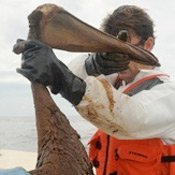Although oil spouting from the April 20 destruction of a British Petroleum deepwater oil well is devastating Louisiana wetlands, state officials say Mississippi Gulf waters are still clear and open for business.
Yesterday, during a FOX news interview, Gov. Haley Barbour urged tourists to not rule out the Mississippi Gulf Coast as a destination in the midst of the historic geyser of oil 40 miles off the coast of Louisiana.
"[W]e have had virtually no oil," Barbour told FOX News Anchor Chris Wallace. "If you were on the Mississippi Gulf Coast any time in the last 48 days you didn't see any oil at all. We've had a few tar balls, but we've had--we have tar balls every year as a natural product of the Gulf of Mexico."
Barbour went on to say the national media is doing more damage to the Mississippi tourism industry than the oil: "The biggest negative impact for us has been the news coverage. There has been no distinction between Grand Isle and Venice and the places in Louisiana that we feel so terrible for that have had oil washing up on them," Barbour said. "But the average viewer to this shore thinks the whole coast from Florida to Texas is ankle-deep in oil. ... [T]he worst thing for us has been how our tourist season has been hurt by the misperception of what's going on down here."
"The Mississippi Gulf Coast is beautiful," Barbour said. "As I tell people, the coast is clear. Come on down."
Gulfport Councilman Kenneth Casey agreed with Barbour's assessment of a clean Mississippi coast.
"I work as a longshoreman and right now we don't see any signs of any type of oil, although we have had reports of tar balls in the area. But they don't know if it's from (the BP well) or someplace else. Right now they're doing tests on it," Casey told the Jackson Free press. "So far, so good."
The clear water near the beach says nothing about the amount of damage going on under the water's surface, however. Douglas N. Rader, chief ocean scientist with the Environmental Defense Fund said that the occasional dead turtle or oiled bird is only the "tip of the oil spill iceberg."
"The toxins from oil pollution are taken up into living animals through food chains, yielding potentially toxic effects generations down the line for a very wide array indeed of sea creatures," Rader told the Jackson Free Press. adding that "97 percent of (Gulf) seafood species are tide up in marshes and along shorelines in their lifetimes."
The National Oceanic and Atmospheric Administration is taking this reality to heart, and restricting fishing in federal waters less than 20 miles off the Mississippi coast, according to NOAA's June 7 fishery closure boundary.


